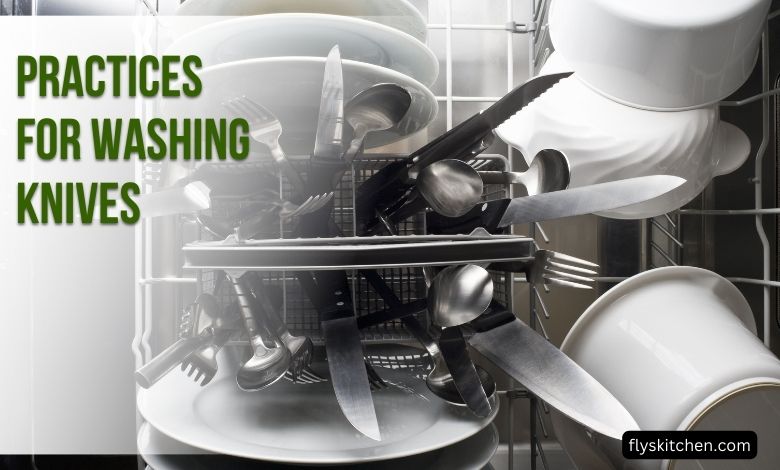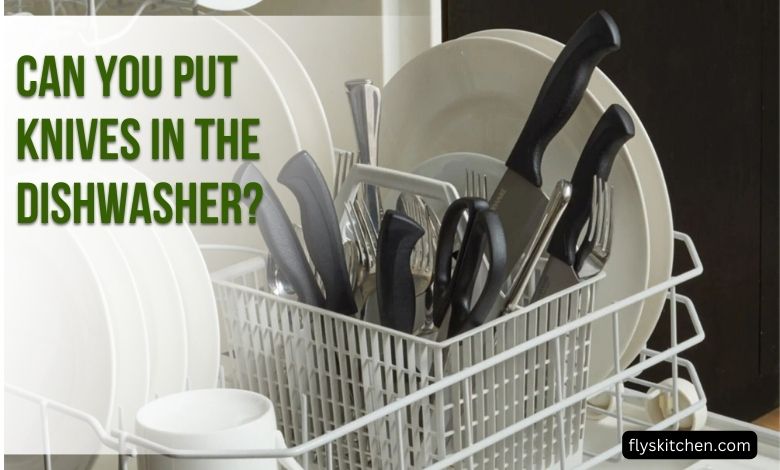For many busy women, using the dishwasher can be a convenient way to clean cookware and utensils. However, when it comes to sharp kitchen knives, there is debate over whether putting them in the dishwasher is a wise idea. This article will examine if it is safe to put knives in the dishwasher and provide tips for properly caring for cutlery.
Contents
An Overview of Dishwashers and Knives
Dishwashers provide high-heat water and strong detergents to clean dishes. The typical dishwasher cycle reaches temperatures between 140-160°F. Many dishwashers also have food grinder features that physically remove debris from dishware during the wash cycle.
Kitchen knives are made from various materials including stainless steel, carbon steel, ceramic, and more. Quality knives are designed to retain a sharp edge and resist corrosion over time with proper care. The blade’s sharpness comes from careful honing and grinding processes applied during manufacturing.
So can the harsh environment inside a dishwasher damage or deteriorate your knives? Let’s take a closer look.
The Effect of Dishwashers on Knife Quality
There are a few ways that repeatedly washing knives in the dishwasher can impact their performance and longevity:
Effects on Sharpness – The grinding action of dishwasher detergent, jets of water, and components banging against each other will gradually dull your knife’s edge. Knives rubbed against other utensils or dishware may get micro dings and abrasions along the blade.
Corrosion Risk – Dishwasher detergents are formulated to be highly alkaline (pH 9-12) to help break down and remove soils. But this alkalinity can react with metals over time and lead to corrosion or pitting.
Damage to Handles – Knife handles can become damaged from the heat and moisture inside a dishwasher. Glues and sealants may deteriorate. Wood handles may crack or warp. Plastics can become brittle.
According to a survey by the American Knife & Tool Institute, 58% of respondents said their knives became duller and lost their edge after being washed in the dishwasher.
Best Practices for Washing Knives

While it’s generally not recommended to put quality knives in the dishwasher, you can take some precautions to minimize damage if you do:
- Place knives with the handles up to avoid direct exposure of the blades to detergent jets.
- Use a gentle wash cycle and low-heat drying cycle.
- Immediately dry knives by hand after the cycle ends.
- Use a knife-friendly detergent formulated for handwashing knives and blades.
- Separate knives from other dishware and utensils in the dish rack.
The ideal approach is to hand wash, rinse, and immediately dry knives after each use. Use mild dish soap and warm water. Gently scrub to remove soils, avoiding abrasive scouring. Rinse and hand dry right away.
Storing knives in knife blocks or sheaths will also prevent dulling of the edge between uses. Honing steels or sharpening stones can be used regularly to realign and sharpen the edge as needed.
Dishwasher Effects on Specific Knife Types
Certain kinds of kitchen knives are more prone to dishwasher damage than others:
- Carbon steel knives – These knives rust and corrode easily when exposed to moisture. The dishwasher environment will lead to discoloration, spotting, and loss of the cutting edge.
- Ceramic knives – While the ceramic blade may hold up, adhesives used in composite handles can fail in hot dishwasher cycles. This leads to loosening or detachment of the handle.
- Forged knives – High-quality forged knives keep their sharpness when maintained properly. The moisture and detergent bath in a dishwasher will gradually degrade the blade and finish.
- Serrated knives – The delicate serrations on bread and tomato knives will wear down much faster when subjected to dishwasher cleaning.
- Folding pocket knives – Small joints and mechanisms can seize up when penetrated by hot steam and detergents in a dishwasher. The blades will also lose their edge.
Studies by researchers at the University of California, Davis have demonstrated quantifiable dulling, corrosion, and damage to kitchen knives after repeated dishwasher cleaning.
Dishwasher-Safe Knives
If convenience is paramount, there are some knife options designed to hold up better in the dishwasher:
- Stamped stainless steel knives – Made from a single sheet of stainless steel, these knives have a bit more flexibility and durability than forged knives.
- Full tang wood handle knives – The handle is a single continuous piece of wood scaled to the knife blade. Helps prevent loosening issues.
- Plastic handled knives – Molded plastic handles are watertight and can withstand higher dishwasher temperatures.
- Teflon-coated ceramic knives – The coating prevents staining and corrosion of the ceramic material.
- Self-sharpening knives – Brands like Shun Premier have proprietary alloys that continuously sharpen with use.
However, even these “dishwasher safe” knives will eventually show decline in performance compared to hand washing. Consider the dishwasher risks before buying expensive cutlery.
Frequently Asked Questions
Should you put expensive knives in the dishwasher?
No. High-end forged knives with full tang handles and custom blade alloys should always be hand washed and immediately dried to maintain edge sharpness and prevent corrosion.
How can you remove knife stains from the dishwasher?
For light staining, use a stainless steel polish made specifically for cutlery. For heavier staining, try a diluted vinegar soak followed by non-abrasive sponges and polishing compound. Avoid acidic cleaners which can damage blades further.
How should you wash and store antique or collectible knives?
Vintage carbon steel knives should be gently hand washed with mild dish soap and warm water. Dry fully with a soft towel, and cover with protective oil before storage. Never soak vintage knives or put them in the dishwasher.
Can knives with plastic handles go in the dishwasher?
Some can, check manufacturer guidelines. Inspect plastic handles regularly for signs of melting, cracking, or loosening. Hand washing is still best for longevity.
How can you sharpen knives dulled in the dishwasher?
Use sharpening stones or electric knife sharpeners to reshape the edge. A honing steel can help realign rolled edges between sharpening. Take knives to a professional sharpener for major restoration.
Conclusion
While it may seem convenient, putting kitchen knives in the dishwasher can lead to a variety of problems over time. The best practice is to hand wash, rinse and immediately dry cutlery after each use. For those who choose to machine wash knives, take steps to minimize exposure to heat, moisture and detergents. Invest in blade materials designed to better withstand the dishwasher environment. With proper care and sharpening, quality kitchen knives will provide years of optimal performance.

